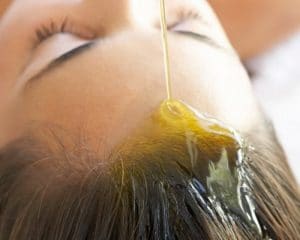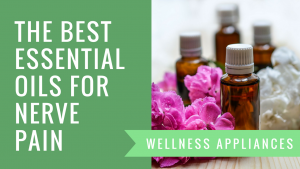Contents
- What is dandruff?
- What causes dandruff?
- Best essential oils for dandruff
- 1. Rosemary (ROSMARINUS OFFICINALIS)
- 2. Lemon (CITRUS LIMON)
- 3. Peppermint (MENTHA PIPERITA)
- 4. Lavender (LAVANDULA ANGUSTIFOLIA)
- 5. Carrot seed (DAUCUS CAROTA)
- 6. Tea tree (MELALEUCA ALTERNIFOLIA)
- 7. West Indian Bay (PIMENTA RACEMOSA)
- 8. Cedarwood (CEDRUS ATLANTICA, JUNIPERUS ASHEI, JUNIPERUS VIRGINIANA)
- 9. Chamomile (MATRICARIA RECUTITA)
Most of us are familiar with the unpleasantness of dandruff. Sadly, white and flaky stuff on the hair and shoulders do not compliment anyone, and it makes for a lot of awkward moments, especially for those who love wearing dark clothes. And when no commercial products or other remedies seem to work, you might start feeling desperate and annoyed with your affliction. But fear not as there is something that could help you get rid of this excess dead skin once and for all – essential oils.
These powerful plant essences offer a gentle and effective way for treating various conditions, including dandruff. Even better is the fact that you will be using a completely natural remedy instead of sometimes harsh synthetic chemicals. Read on to find out what might be causing your condition and which essential oils are the most helpful to finally have a healthy scalp.
What is dandruff?
Dandruff is a condition that causes flaky skin to shed from the scalp. The flakes are usually oily thus they clump together, and the scalp can also be itchy, red and inflamed. Dandruff does not mean that the person has poor hygiene – it can happen to the best of us, although brushing and shampooing more often might help.
Even though dandruff may seem as a minor problem, those who suffer from it can develop social and self-esteem problems as well. Dandruff is usually a chronic and recurrent condition thus keeping some effective remedy at home at all times is recommended.
What causes dandruff?
For people with dandruff the skin cells on the scalp mature and shed much faster than for those with healthy skin. The causes of dandruff are a somewhat grey matter yet there are several factors that might be related to it.
- Seborrheic dermatitis
This condition involves red, greasy skin covered with flaky white or yellow scales. Seborrheic dermatitis can affect various areas of the body, especially those that have more oil glands, like the sides of your nose, behind the ears, the groin etc. This condition can also appear on the scalp, leading to dandruff from extra skin cells dying and falling off.
- Contact dermatitis
Check the ingredients of your hair care products carefully as sometimes sensitivity to some of them might lead to a dry, itchy and flaky skin. Try switching the products, preferably to something natural!
- Not brushing or shampooing the hair often enough
The build–up of oil and skin cells on your scalp can cause dandruff. However, be sure to use appropriate hair care products that do not disrupt the natural sebum level of your skin, because too much shampooing can have the opposite effect, leading to more dandruff and oilier hair.
- Bacteria and fungi
Bacteria, such as Propionibacterium and Staphylococcus, as well as the scalp fungus Malessezia globose can be responsible for the formation of dandruff. The yeast-like fungus affects only some people, creating an inflammatory response.
- Dry skin and other skin disorders
Dry skin, in particular during the winter heating season, can result in small, dry flakes of skin to come off the scalp. People with psoriasis and eczema also tend to get dandruff more often. Luckily, essential oils are there to help with these conditions as well.
- Diet and stress
Poor diet with insufficient intake of vitamins such as zinc, omega-3 fatty acid and iron can contribute to the formation of dandruff. Taking care of the nutrient content in your diet can lead to better hair and skin health.
Furthermore, stress has been linked to a weakened immune system and other symptoms, making it harder for the body to fight such complaints as dandruff. And although food and stress are not proven to be direct causes of dandruff, they might worsen the condition.
- Age and sex
Dandruff often appears during puberty and it affects men more frequently than women. Some researchers believe that hormones might be to blame for the appearance of dandruff as well.
- Certain diseases
People with some neurological illnesses, like Parkinson’s disease, tend to be more prone to dandruff. HIV and a compromised immune system can also increase the chances of having this condition.
Whatever the cause of dandruff might be in your case, trying out essential oils may just offer the solution you have been looking for. The following list combines the best of the best essential oils to get rid of dandruff for good.
Best essential oils for dandruff
1. Rosemary (ROSMARINUS OFFICINALIS)
The fresh and herbaceous rosemary essential oil is one of the best household remedies to have. Good for a number of ailments, including arthritis, colds, and headache, this oil is also an excellent tool in the fight against dandruff.
Anti-inflammatory, antibacterial and antifungal, it helps keep the white flakes at bay, as well as increases the blood circulation in your scalp, promoting faster hair growth and skin renewal. Use it in case of eczema, dermatitis and greasy hair as well.
How to use it
Combine 3 drops of rosemary essential oil with 2 drops of peppermint essential oil and dilute the mixture in 10 ml of carrier oil like jojoba or argan oil. Rub the mixture in your scalp and leave it from 30 minutes to two hours, then wash your hair. Repeat every day until the condition improves.
2. Lemon (CITRUS LIMON)
While sailors in the past successfully used lemon to fight off scurvy, we can embrace its beneficial properties to treat less life-endangering conditions as well.
In addition to the energising fragrance, lemon essential oil has antibacterial, antifungal, anti-inflammatory, antiseptic and antimicrobial properties all useful for alleviating dandruff. It is a powerful tonic that stimulates the flow of blood and helps treat oily skin, as well as itchy and flaky skin conditions.
How to use it
Adding 10 drops of lemon essential oil to 200 ml of unscented shampoo will make an energising and uplifting hair wash that will also help improve the state of your scalp.
3. Peppermint (MENTHA PIPERITA)
This antiseptic, antibacterial and anti-inflammatory essential oil can soothe itchy and painful skin which is often the result of dandruff. It also helps with psoriasis and eczema. The high level of menthol in the oil provides a cooling sensation. Besides, peppermint essential oil can promote thicker hair growth which is a desirable added benefit.
How to use it
Add 6 drops of peppermint essential oil and 4 drops of rosemary essential oil to 200 ml of unscented shampoo to create a stimulating and toning hair wash. No to mention your hair will smell wonderful as well!
4. Lavender (LAVANDULA ANGUSTIFOLIA)
One of the most popular essential oils out there, lavender essential oil has become a classic in aromatherapy. But for good reason though as its excellent properties include being antibacterial, antifungal and antiseptic – all of these qualities are beneficial in the case of a dandruff infestation. People with oily skin, dermatitis, eczema and psoriasis and even lice can also benefit from lavender essential oil.
How to use it
To create a calming and healing oil for your scalp, combine 3 drops of lavender essential oil with one drop of cedarwood essential oil and 2 drops of lemon essential oil. Dilute this mixture in 10-15 ml of carrier oil and rub on your scalp, leaving it in for a couple of hours. Then wash it out and enjoy the benefits! Repeat the treatment for at least two weeks.
5. Carrot seed (DAUCUS CAROTA)
The lesser used carrot seed essential oil has antiseptic, stimulating and toning properties making it fit to relieve the symptoms of dandruff, psoriasis, eczema and oily skin. A high content of Vitamin B promotes the growth of strong and shiny hair. Together with the stimulating effect of carrot seed essential oil and its rich antioxidant content this can make an effective hair and scalp health-booster.
How to use it
Since carrot seed essential oil has a strong smell, you might want to dilute 2 drops of carrot seed oil with, for instance, 3 drops of citrus essential oil and 1 drop of cedarwood essential oil. Added to 10-15 ml of carrier oil this will make an effective remedy to use on the scalp against dandruff and similar conditions.
6. Tea tree (MELALEUCA ALTERNIFOLIA)
The antibacterial, antiseptic and antifungal tea tree essential oil does wonders for the skin. A staple in disinfection and acne treatment, this powerful plant essence is useful for alleviating such skin conditions as psoriasis and dandruff as well. Tea tree oil can significantly reduce itchiness and flakiness of the scalp, and it stimulates the immune system, helping fight off the attack of microorganisms that might be causing dandruff.
How to use it
If you are not a fan of the characteristic smell of tea tree essential oil, mix it with, for example, lavender essential oil (3 drops of tea tree oil and 6 drops of lavender oil), and either add this blend to an unscented shampoo or to a carrier oil like jojoba to use as a hair mask. Use it regularly until the symptoms subside.
7. West Indian Bay (PIMENTA RACEMOSA)
The main ingredient of the classic men’s fragrance bay rum, West Indian Bay is also known as a wonderful hair tonic. Use this antiseptic and antifungal essential oil to stimulate hair growth and improve the condition of greasy and lifeless hair. Another effective way of using West Indian bay oil is as a hair rinse for dandruff. Besides, your hair will smell sweet, spicy and altogether lovely after a treatment of this essential oil.
How to use it
Blend 3 drops of West Indian bay essential oil with 1 drop of lavender essential oil and 2 drops of lemon essential oil and dilute the mixture in a couple of table spoons of carrier oil for an extra strong antidandruff oil. Massage it in your scalp and leave it in for at least 30 minutes or leave it for the whole night, then wash out with a natural shampoo.
You could also make an overnight hair rinse with West Indian bay essential oil and vinegar. Simply add a couple of drops to one table spoon of apple cider vinegar and dilute in water. Massage this into your scalp before going to bed and wash it out in the morning. Besides, water-diluted apple cider vinegar is a great remedy for dandruff on its own as well.
8. Cedarwood (CEDRUS ATLANTICA, JUNIPERUS ASHEI, JUNIPERUS VIRGINIANA)
Cedarwood essential oil has a long history and a wide range of benefits, including the ability to fight dandruff, eczema, psoriasis, greasy hair and oily skin, as well as hair loss. Cedar oil was once an ingredient of a powerful poison antidote, and it was highly prized in ancient Lebanon.
The antifungal, anti-inflammatory, antiseptic, stimulant and tonic cedarwood essential oil can help reduce skin irritation and inflammation. It also boosts circulation and stimulates hair follicles, allowing your hair to grow thick and strong.
How to use it
To combat the symptoms of dandruff, add a couple of drops of cedarwood essential oil to a carrier oil like organic olive or grapeseed oil and rub the mixture into your scalp. Leave it in for at least 30 minutes before washing it out.
9. Chamomile (MATRICARIA RECUTITA)
The wonderful, deep blue-coloured chamomile essential oil offers a wide range of benefits for the skin. It is anti-inflammatory, antiseptic and anti-bacterial. Used to treat psoriasis, eczema, dermatitis, inflammations and itchy skin, chamomile essential oil can help your scalp fight the excess shedding of skin, all the while calming you as well.
How to use it
For a dandruff treatment, add 5-10 drops of chamomile essential oil to 200 ml of unscented shampoo.
As you can see, there are many options for using essential oils to combat dandruff, dry skin on the scalp and greasy hair once and for all. The added benefit is the fact that most of these essential oils have other valuable qualities as well which will surely have your hair thicker, stronger and shinier in no time!
However, if your condition does not improve or worsens after two weeks to a month of essential oil use, consider seeing a doctor. You can always use essential oils as a preventive measure or additional therapy for dandruff and related scalp conditions.
Caution! Always conduct a patch test on the skin when trying out a new essential oil and avoid using essential oils undiluted as well as ingesting them without prior knowledge. It is best to consult a medical practitioner before using any essential oil, especially in the case of pregnancy, epilepsy or when used on children. This article does not substitute professional medical advice and is meant for general information purposes only.
For more on uses of essential oils, and different things they can be used for, please check out our complete list of essential oils and what they are used for.














